There are couple of issues. You can fix it with below two Options:
Option 1:
1) Make a new copy of original array and use it as reference array to reverse
2) In reverse function, update values of array that has been passed in parameter and reverse it using reference array
public class Test {
public static void main(String[] args) {
int[] oldList = {1, 2, 3, 4, 5};
reverse(oldList);
for (int i = 0; i < oldList.length; i++)
System.out.print(oldList[i] + " ");
}
public static void reverse(int[] list) {
// create a copy of initial array to use it to reverse
int[] newList = Arrays.copyOf(list,list.length);
for (int i = 0; i < list.length; i++)
// update original array and reverse it. Calling method still have reference to this array
list[i] = newList[list.length - 1 - i];
}
}
Console Output:

PS: Here the idea is to ensure the reference of array remains the same. You can do it using another array as reference array or using another local variable and swapping two values inside array or doing XOR between i and n-i-1 variable. There are n number of ways out of which 1 has been shared above.
Option 2:
1) No need to copy the reference of the old array to new array in reverse method
2) Return the new array reference back to the calling method
3) For above point you will also have to change the return type of reverse function
4) Save the new reference of array in a variable in the main method and then print from the same.
Please find my comments below:
public class Test {
public static void main(String[] args) {
int[] oldList = {1, 2, 3, 4, 5};
//save the return list to a variable
int[] newList= reverse(oldList);
for (int i = 0; i < newList.length; i++)
//print the data from new list
System.out.print(newList[i] + " ");
}
// change the return type
public static int[] reverse(int[] list) {
int[] newList = new int[list.length];
for (int i = 0; i < list.length; i++)
newList[i] = list[list.length - 1 - i];
//remove this line as there is no point of copying old array back to new array
// list = newList;
//retrun newlist reference to the calling method
return newList;
}
}
Console Output:


